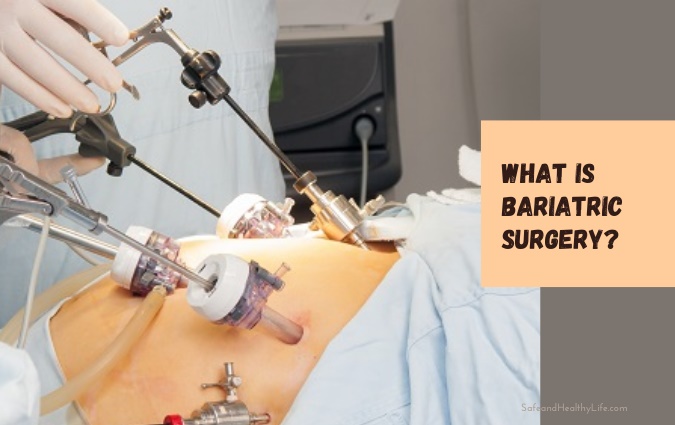
Bariatric surgery is also called weight-loss surgery, which includes gastric bypass and other weight-loss treatments, involves making adjustments to your digestive system to help you lose weight.
When diet and exercise haven’t worked or you’re having major health problems as a result of your weight, you may need bariatric surgery.
You may be limited in how much you can consume as a result of some operations. Other methods function by inhibiting the body’s capacity to absorb nutrients. Some procedures combine both.
In this article, Dr. Harsh Seth who is well known for weight loss surgery in Mumbai says that while bariatric surgery has many advantages, all weight-loss surgeries are big procedures with significant risks and negative effects.
To help assure the long-term effectiveness of bariatric surgery, you must also make permanent healthy dietary adjustments and exercise regularly.
Why is it done this way?
Bariatric surgery is performed to help you lose weight and minimize your chance of developing potentially fatal weight-related health conditions, such as:
- Stroke and heart disease
- Blood pressure that is too high
- NAFLD, also known as nonalcoholic steatohepatitis, is a type of nonalcoholic fatty liver disease (NASH)
- Apnea (sleep deprivation)
- Diabetes type 2
Typically, bariatric surgery is performed only after you’ve attempted to lose weight through improving your diet and exercise routines.
Who is it for?

In general, bariatric surgery may be an option for you if you meet the following criteria:
According to Dr. Harsh Seth, If your BMI is 40 or greater, you’re overweight (extreme obesity). If your BMI is 35 to 39.9 (obesity) You have a serious weight-related health concern, such as type 2 diabetes, high blood pressure, or severe sleep apnea.
If your BMI is 30 to 34 and you have major weight-related health concerns, you may be eligible for some form of weight-loss surgery.
Not everyone who is excessively overweight is a candidate for bariatric surgery. To be eligible for weight-loss surgery, you may need to meet certain medical requirements.
To check if you qualify, you’ll probably have to go through a lengthy screening process. To live a healthier lifestyle, you must also be willing to make long-term adjustments.
Long-term follow-up plans, which may include monitoring your nutrition, lifestyle, and behavior, and medical issues, may be required of you.
What are the risks involved?

Bariatric surgery, like any major procedure, has the risk of health complications.
The following are some of the risks linked with the surgical procedure:
- A lot of blood
- Infection
- Anesthesia-related side effects
- Clots in the blood
- Breathing or lung difficulties
- Your gastrointestinal system has leaks.
How do you get ready?
If you are a candidate for bariatric surgery, your doctor will give you information on how to prepare for the procedure. Before surgery, you may need to have a variety of lab tests and checkups, says Dr. Harsh Seth who is a Bariatric and laparoscopic surgeon.
You may be limited in what you can eat and drink, as well as which drugs you can use. You may be forced to start a physical exercise program and give up smoking.
You may also need to plan for your rehabilitation following surgery. If you anticipate you’ll need assistance at home, make arrangements for it.
What you might expect?
Bariatric surgery is performed under general anesthesia in a hospital setting. This indicates that you will be unconscious throughout the process.
The specifics of your surgery are determined by your circumstances, the type of weight-loss surgery you choose, and the hospital or doctor’s policies. Some weight-loss operations need traditional big or open abdominal incisions.
The majority of bariatric surgeries are now done laparoscopically. A laparoscope is a tiny tube with a camera attached to it. The laparoscope is placed into the belly through tiny incisions.
The surgeon can see and operate within your abdomen without making major incisions thanks to the tiny camera on the tip of the laparoscope. Although laparoscopic surgery can speed up and shorten your recovery time, it is not for everyone.
Typically, the surgery takes several hours. You awaken in a recovery room after surgery, where medical personnel keeps an eye on you for any issues. You may need to stay in the hospital for a few days depending on your surgery.
Results:
Dr. Harsh Seth says that Long-term weight loss is possible with gastric bypass and other bariatric operations. The amount of weight you lose is determined by the type of surgery you have and the changes you make in your lifestyle. Within two years, you may be able to shed half of your additional weight, if not more.
In addition to weight loss, gastric bypass surgery may help to alleviate or resolve several problems that are commonly associated with obesity, such as:
- Coronary artery disease
- Blood pressure that is too high
- Obstructive sleep apnea (OSA)
- Diabetes type 2
- NAFLD, also known as nonalcoholic steatohepatitis, is a type of nonalcoholic fatty liver disease (NASH)
- Gastroesophageal reflux disease (GERD) is a type of gastroesophageal reflux (GERD)
- Osteoarthritis is a type of arthritis that affects the joints (joint pain)
- Gastric bypass surgery can also help you accomplish daily activities more easily, which can improve your quality of life
About The Author:
Murshid Paravath is a passionate health blogger. Enjoys writing about all of the health-related issues that affect various parts of the body and addressing her readers about the care that needs to be taken in today’s world.




